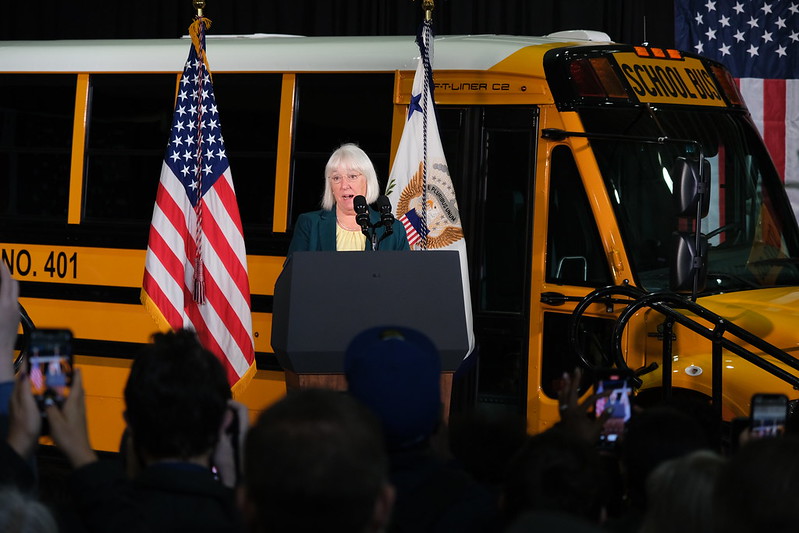Washington, D.C. – Today, U.S. Senators Patty Murray (D-WA), Chair of the Senate Committee on Appropriations, and Maria Cantwell (D-WA), Chair of the Senate Committee on Commerce, Science, and Transportation, announced $59,027,499 in clean-energy-related grants for transit authorities in King, Skagit, Island, Grays Harbor, Grant, and Whatcom Counties.
The funding comes from the Federal Transit Administration (FTA) Grants for Buses and Bus Facilities and Low and No-Emission (Low-No) Vehicle programs. The Cantwell-Murray supported Bipartisan Infrastructure Law (BIL) provides over $7.5 billion for these competitive grant programs through Fiscal Year 2026.
“Investing in clean buses and other low- and no-emissions transportation options means cleaner air for families, communities, and our planet—not to mention cost savings for local transit agencies,” said Senator Murray. “The federal dollars I fought to secure for these grant programs in the Bipartisan Infrastructure Law are already helping our nation take big steps forward in shifting towards a clean energy economy, which benefits everyone. This is going to make a real difference in lowering costs and creating jobs.”
“These smart investments in bus facilities and low or no emissions buses across the State of Washington will provide cleanerand more reliable transportation services,” said Senator Cantwell. “It’s important that we invest in clean transit services to help reduce traffic, keep residents moving to where they need to go, and make progress towards our climate goals.“
King County Metro Transit – $33.5 million
King County Metro Transit received $33,552,634 in Low-No Vehicle grants. The funding will be used to buy 30 battery-electric buses, purchase charging equipment, and train workers to maintain the new electric fleet. New battery-electric fleet will serve 27 bus routes that run in low-income areas and will expand the King County Metro apprenticeship program and promote transit careers for residents in underserved communities.
Whatcom Transportation Authority (WTA) — $9.6 million
The Whatcom Transportation Authority received $9,644,865 to buy 11 diesel-electric hybrid buses to replace three, 14-year-old diesel buses and eight older hybrid buses that have been in service since 2012. The new diesel-electric hybrid fleet will reduce fuel consumption by 24% and greenhouse gas emissions by 49%. The project will also provide rural dial-a-ride, Mobility-on-Demand, and vanpool service throughout Whatcom County. The new fleet will provide reliable service to the residents of Bellingham and neighboring towns and rural areas, including the Lummi Reservation and the Nooksack Trust Lands.
Island Transit (WSDOT) — $7.5 million
The Washington State Department of Transportation (WSDOT) received $7,526,400 for the design, engineering, and construction of the South Whidbey Transit Center. The new transit hub will have six bus bays, which will allow the agency to expand zero-emission bus service and connect South Whidbey residents for ferry services, trails, and businesses in South Whidbey Island.
Skagit Transit System – $5 million
The Skagit Transit System will receive $5,000,000 to repair its maintenance operations and administrative facility. The funding will expand service and support future expansion to connect residents to their jobs, education opportunities, and social and medical services.
Grant & Grays Harbor Counties (WSDOT) — $3.3 million
WSDOT will receive $3,303,600 in funding to buy transit vehicles and a bus washing system for Grays Harbor Transit Authority and the Grant Transit Authority to replace aging buses. The project will help expand service and improve the quality and reliability of transit to over 175,000 rural Washington residents that need to access jobs and essential services.
###


